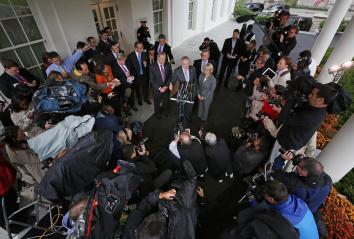The creep of government surveillance is beginning to take its toll on journalists.
That’s according to a comprehensive new report on press freedom in the United States, published Thursday by the New York-based Committee to Protect Journalists. The report is the first such effort by the CPJ in its 32-year history and was authored by the Washington Post’s former executive editor, Leonard Downie Jr. (Downie is now a journalism professor at Arizona State University; ASU is a partner with Slate and the New America Foundation in Future Tense.)
The findings, based on interviews with reporters, editors, and government officials, present a startling picture of the deteriorating state of press freedom in the United States in 2013. The report suggests that the Obama administration’s aggressive crackdowns on leaks of classified information are drying up sources like never before. And concerns about the government’s power to snoop on communications appear to be having a toxic effect on journalists’ ability to function.
As Pulitzer Prize-winning Washington Post reporter Dana Priest says in the report, “people think they’re looking at reporters’ records. I’m writing fewer things in e-mail. I’m even afraid to tell officials what I want to talk about because it’s all going into one giant computer.”
Earlier this year, fears about potential government surveillance of journalists were amplified by cases involving reporters at Associated Press and Fox News. In two separate leak investigations, it was revealed that the Justice Department grabbed AP journalists’ phone records, while authorities snooped on the email inbox of a Fox News correspondent. Recent revelations about the scope of NSA’s electronic spying programs have only added to the chilling effect. Though there is no evidence (yet) that the NSA has used its spy programs like PRISM and XKEYSCORE to monitor American reporters, that the agency receives a daily record of almost every domestic and international phone call made from the United States is likely enough to prompt most journalists to change how they communicate.
The situation is undoubtedly much worse for non-American reporters operating outside the United States, who are not covered by the Fourth Amendment’s protections against unreasonable searches and seizures. The Foreign Intelligence Surveillance Act is so vaguely worded that it effectively gives the NSA carte blanche to covertly intercept the communications of non-American journalists working overseas, assuming they are deemed to hold relevant “foreign intelligence” information or be part of a “foreign political organization.” Indeed, recent reports have indicated that the NSA has a track record in this area—targeting the news organization Al Jazeera for surveillance. And it is safe to assume that other spy agencies, such as the United Kingdom’s GCHQ, are engaged in similarly dubious practices.
The CPJ has sent the White House a letter urging it to, among other things, “develop policies to limit surveillance of journalists’ communications to ensure the integrity of a journalist’s right to protect his or her sources.” But journalists could be well advised not to rely on government policies to protect their sources. A more practical and immediate option is for reporters to take matters into their own hands—by adopting strong encryption tools that help throw a blindfold over the government’s prying eyes.
